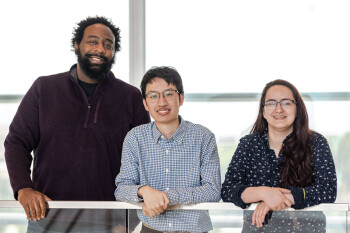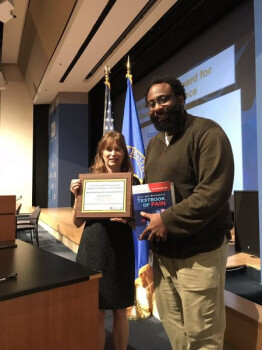Postdoc - Pain Neurobiology
UT Dallas - 2017
Michael Burton Jr.
Eugene McDermott Distinguished Professor
Associate Professor - Department of Neuroscience
Department of Neuroscience
Center for Advanced Pain Studies - founding member
Research Interests: Molecular & Integrative Neuroscience. How the immune and nervous systems communicate to influence pain and comorbidities like depression and anxiety. With an emphasis on whole-body and cell metabolism.
972-883-7273
BSB 10.546
Neuroimmunology and Behavior Lab
Endowed Profile
Lab Twitter
Curriculum Vitae
ORCID
Not currently accepting undergraduate students
Professional Preparation
Postdoc - Diabetes, Metabolism, & Hypothalamic Research
UT Southwestern Medical Center - 2015
UT Southwestern Medical Center - 2015
PhD - Animal Science - Immunophysiology and Behavior
University of Illinois at Urbana-Champaign - 2012
University of Illinois at Urbana-Champaign - 2012
B.S. - Animal Science & Biotechnology
University of Illinois at Urbana-Champaign - 2006
University of Illinois at Urbana-Champaign - 2006
Research Areas
Research Interests
Cellular and Molecular Neuroscience. How peripheral stimuli (painful stimuli, diet, alcohol, & immune activation) communicate to the CNS to elicit complex behaviors: An emphasis on pain, depression, and metabolism. Using behavioral assays, molecular genetics, in-vivo imaging, biochemistry, and pharmacology.Research Statement
Dr. Burton is an Associate Professor whose research focuses on the interactions of the immune and nervous systems to regulate pain and energy homeostasis. The lab is interested in aging, nutrition, alcohol consumption, and immune activation. Dr. Burton received his BS and PhD in Animal Sciences with a focus on Immunophysiology and Behavior at the University of Illinois at Urbana-Champaign. He then moved to Dallas, TX to begin his postdoctoral fellowship work in the Department of Hypothalamic Research at UT Southwestern Medical Center. There Dr. Burton gained skills in molecular genetics, neuroendocrinology, and neuroanatomy; in studies that focused on how peripheral ganglia recognized dietary components. He then moved to the UT-Dallas campus to focus on how immune cells influence the transition to chronic pain, bioinformatics, and in-vivo 2-photon imaging. It was the fusion of these 2 experiences that formed the basis of a NIH-(K)Transition-to-Faculty Award. He believes in order to traverse the gap between basic research and clinical application to the patient, we must realize and appreciate pre-clinical and translational research. He is excited at the notion to play a role in this process, and help humankind through his research in pain development, depression, and metabolic disorders that we deal with every day.Publications
Not Just Neurons: Pain Is Orchestrated in Partnership with Many Non-neuronal Cells 2025 - Journal Article
Systems neuroimmunology: current bottlenecks, research priorities and future directions 2025 - Journal Article
Intravenous streptozotocin induces variants in painful diabetic peripheral neuropathy in female mice 2025 - Other
Intravenous Streptozotocin Induces Variants in Painful Diabetic Peripheral Neuropathy in Female Mice 2025 - Journal Article
12/15-lipoxygenases mediate toll-like receptor 4-dependent nociplastic pain hypersensitivity in female mice 2025 - Journal Article
Paclitaxel-induced neuroinflammation after systemic administration in male and female mice 2025 - Journal Article
Paclitaxel-Induced Neuroinflammation After Systemic Administration in Male and Female Mice 2025 - Journal Article
Interspecies differences in the expression of cannabinoid receptors at the tissue and cellular levels 2025 - Journal Article
Awards
Recognition of Outstanding Achievements in Research (ROAR) - UT Dallas Office of Research and Innovation [2024]
FRIEND of the Office of Research and Innovation: Federal Research Innovation and ExpeNditures Dynamo - UT Dallas Office of Research and Innovation [2024]
2024 Neuroscience Teaching Award - UT Dallas Department of Neuroscience [2024]
Eugene McDermott Distinguished Professorship - UT Dallas [2023]
Initiative for Maximizing Student Development (IMSD) Invited Lecturer - UT Health San Antonion [2023]
Provost Distinguished Lecturer - Louisiana State University [2023]
SFNova/Rising Star - Society for Neuroscience [2022]
Fellow - African Science Institute [2021]
Certificate of Congressional Recognition - U.S. House of Representatives [2021]
2021 Neuroscience Research Award - UT Dallas - Dept of Neuroscience [2021]
Appointments
Eugene McDermott Distinguished Professor
UT Dallas [2022–Present]
Endowed Professor Position
UT Dallas [2022–Present]
Endowed Professor Position
Associate Professor with Tenure
UT Dallas [2023–Present]
Neuroscience Department
UT Dallas [2023–Present]
Neuroscience Department
Founding Member
Center for Advanced Pain Studies (CAPS) [2019–Present]
CAPS
Center for Advanced Pain Studies (CAPS) [2019–Present]
CAPS
Assistant Professor
UT Dallas [2017–2023]
Neuroscience Department
UT Dallas [2017–2023]
Neuroscience Department
Affiliate
Center for Vital Longevity [2020–Present]
CVL
Center for Vital Longevity [2020–Present]
CVL
Projects
Neuroimmune communication – how peripheral neurons communicate with immune cells to mediate pain states and co-morbidities. Cell-specific TLR4 signaling. Chronic Muscle Pain/Fibromyalgia (clinical outcomes).
Translational project utilizing novel genetic rodent models with a clinical aspect utilizing human patients and samples.Mechanisms of aging – how aging and sex influence the immune system, metabolism, and behavioral plasticity.
Translational project utilizing rodent models with a clinical aspect utilizing human tissue.The role of cannabinoids in mediating affective behavior and analgesia – an opioid alternative to chronic pain.
Translational project using novel genetic animal modelsThe role of (neuro)immune biomarkers indicative of pain and delirium, during convalescence – direct clinical implications of this conversation.
Clinical Project in collaboration with UTSW and the University of CincinnatiPresentations
Additional Information
Dr. Burton serves as the Deputy Editor of Neurobiology of Pain and sits on the editorial boards of: Journal of Neuroinflammation, European Journal of Neuroscience, Frontiers in Pain Research, Behavioral Neuroscience, and he is a member of the advisory boards of the Mentoring Institute for Neuroscience Diversity Scholars (MINDS), The Endocrine Society Basic Science Group, and NIH Center for Scientific Review Council for Fellowships
News Articles
Pain Researchers Earn Scholars Award, Society Fellowship
 Dr. Michael Burton, an associate professor of neuroscience at The University of Texas at Dallas, has been selected for the Mayday Pain & Society Fellowship: Communicating Science & Improving Care.
Dr. Michael Burton, an associate professor of neuroscience at The University of Texas at Dallas, has been selected for the Mayday Pain & Society Fellowship: Communicating Science & Improving Care.Burton, Fellow, Eugene McDermott Distinguished Professor and founding member of the Center for Advanced Pain Studies in the School of Behavioral and Brain Sciences, is one of 12 researchers from institutes in the United States and Canada chosen for the 2024-2025 fellowship. The program was launched in 2018 to build the next generation of pain experts who can communicate evidence-based and solution-focused information about pain care and treatment.
Study finds an enriched HFD lowers the threshold to Pain States
 A new study in mice from researchers at The University of Texas at Dallas suggests that a short-term exposure to a high-fat diet may be linked to pain sensations even in the absence of a prior injury or a preexisting condition like obesity or diabetes.
A new study in mice from researchers at The University of Texas at Dallas suggests that a short-term exposure to a high-fat diet may be linked to pain sensations even in the absence of a prior injury or a preexisting condition like obesity or diabetes.The study, published Sept. 1 in the journal Scientific Reports, compared the effects of eight weeks of different diets on two cohorts of mice. One group received normal chow, while the other was fed a high-fat diet in a way that did not precipitate the development of obesity or high blood sugar, both of which are conditions that can result in diabetic neuropathy and other types of pain.
The researchers found that the high-fat diet induced hyperalgesic priming — a neurological change that represents the transition from acute to chronic pain — and allodynia, which is pain resulting from stimuli that do not normally provoke pain.
Embrace the Change: An Interview with Michael Burton
 Michael Burton, PhD, is the Eugene McDermott Assistant Professor in Neuroscience and the principal investigator of the Neuroimmunology and Behavior Lab at the University of Texas at Dallas, US. His research focuses on how age, sex, and neuroimmune interactions influence chronic pain and comorbidities, such as depression and anxiety. He has been recognized as an early-career award winner by several institutions, including the American Pain Society and the Rita Allen Foundation.
Michael Burton, PhD, is the Eugene McDermott Assistant Professor in Neuroscience and the principal investigator of the Neuroimmunology and Behavior Lab at the University of Texas at Dallas, US. His research focuses on how age, sex, and neuroimmune interactions influence chronic pain and comorbidities, such as depression and anxiety. He has been recognized as an early-career award winner by several institutions, including the American Pain Society and the Rita Allen Foundation.
Dr. Burton is co-Director of Research Enrichment Program to stimulate URM participation
The University of Texas at Dallas School of Behavioral and Brain Sciences (BBS) has received a two-year, $900,000 grant from Communities Foundation of Texas’ W.W. Caruth, Jr. Fund to expand neuroscience research opportunities for underrepresented undergraduates from the Dallas-Fort Worth area.The Enhancing Neuroscience Undergraduate Research Experiences (ENSURE) program will cover tuition, housing and stipends for at least 10 exceptional sophomores and juniors who will conduct intensive neuroscience research over two years.
BBS Professor, Biomedical Engineering Doctoral Student Earn Awards
 Dr. Michael Burton, an assistant professor in the School of Behavioral and Brain Sciences, has received the 2019 Mitchell Max Award for Research Excellence from the National Institutes of Health Pain Consortium.
Dr. Michael Burton, an assistant professor in the School of Behavioral and Brain Sciences, has received the 2019 Mitchell Max Award for Research Excellence from the National Institutes of Health Pain Consortium.Burton was selected for his presentation on delayed-onset neuropathic pain in older men. His research suggests that immune system hyperactivity at an advanced age can trigger hyperexcitability in neurons that can produce chronic pain long after an injury.
Activities
Director of the UT Dallas Branch of the UT System LSAMP
The LSAMP Program assists increasing inclusivity in universities and colleges in the STEM workforce through their efforts at significantly increasing the numbers of students successfully completing high quality degree programs in science, technology, engineering and mathematics (STEM) disciplines.co-Director of the Maximizing Access to Research Careers (MARC)
The Maximizing Access to Research Careers (MARC) Program is a National Institutes of Health (NIH) three-year paid scholarship that will provide students with year-round biomedical research experience opportunities and mentorship.https://marc.utdallas.edu/
co-Director of the Enhancing Neuroscience Undergraduate Research Experiences (ENSURE)
The ENSURE program is a 2-year paid scholarship that will provide 10-15 undergraduates with an extended and authentic neuroscience research experience, a robust network of mentoring support, and the necessary skills to successfully gain admittance to graduate or medical school.https://ensure.utdallas.edu/